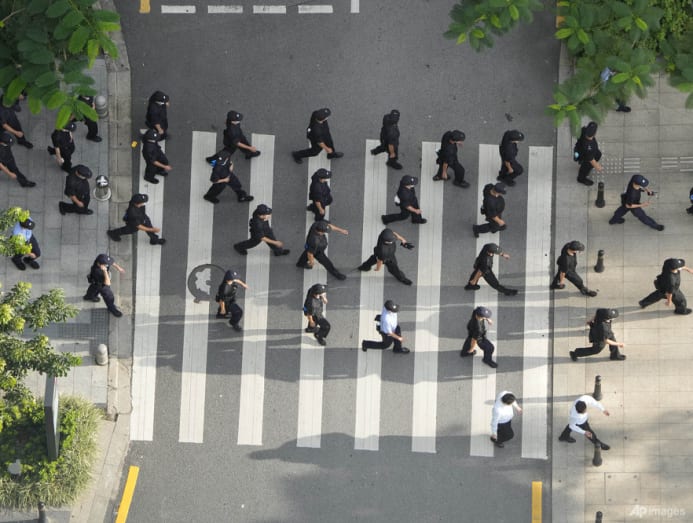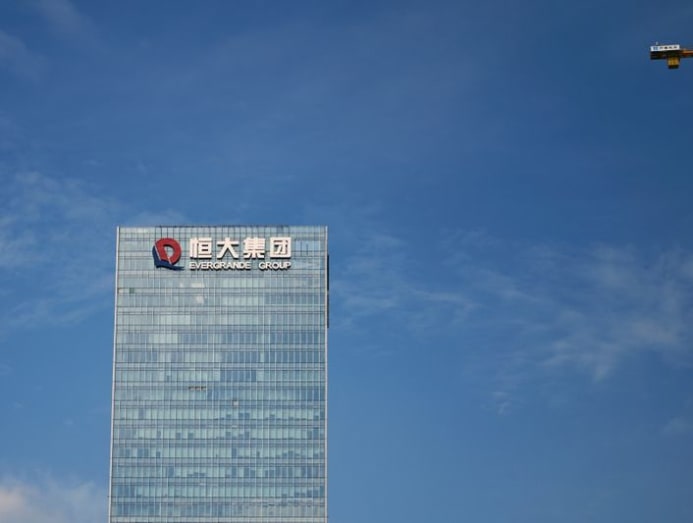Commentary: Evergrande’s troubles show China is susceptible to capitalism’s ill effects
NEW YORK Urban center: For much of this year, commentators have been alarm that falling yields suggest the bail market is increasingly irrational, out of touch with a rapid global recovery and misled by heavy central depository financial institution buying or the ebbs and flows of the pandemic.
Now, events in China suggest the bond markets are far from clueless or crazy. The world'southward most indebted real estate developer, Evergrande, is on the verge of default.
Its troubles are reverberating beyond Communist china's property sector and the world, revealing a very rational reason why long-term interest rates would non ascent likewise far: The global economic system is heavily indebted and likewise financially fragile to handle tighter credit weather condition. Nosotros are caught in a debt trap.
China is stuck in the deep end of this quagmire. In the run-upwards to the global fiscal crunch of 2008, debt levels rose dramatically in the United States and many European countries.
CHINA'S DEBT Rampage
Since and then, China has led the debt binge: Private debt held by households and corporations has risen past nearly 100 per centum points to 260 per cent of gross domestic production in China, bookkeeping for nearly 2-thirds of the global increment.

By early on 2016, China was on the financial brink. Default rates were rising rapidly. Capital was rushing out of the country.
To stave off some other global financial crunch, the US Federal Reserve had to abandon plans to tighten monetary policy and Chinese authorities had to inject massive amounts of coin into the financial system.
Over the adjacent five years, Mainland china slowed much less quickly than one would expect given the debt levels, cheers to the meteoric rise of its tech sector.
The new economy, led by digital technology companies in the individual sector, was nearly debt-gratis and grew explosively. The tech sector now accounts for a staggering 40 per cent of the Chinese economic system, up from xx per cent in 2016.
In the background, however, the debt bomb was yet ticking. After 2016, private debts rose another 20-plus percentage points every bit a share of GDP, with households taking on mortgages at a record pace.
Much of it went to further inflating the property chimera. Nearly 40 per cent of the Chinese banking arrangement's assets are now tied to the property sector.
WORRY OF THE Contagion Event
Evergrande's outstanding debts of more than US$300 billion represent merely 0.6 per cent of full credit in China, only the worry in situations like this is always about the contagion effect of any high-contour default.
Before 2008, the United states of america subprime mortgage market peaked at only U.s.a.$600 billion before it went bust and threatened to take downwards the global financial system.
Most financial analysts argue that People's republic of china can't afford to allow Evergrande get completely bust and chance some other debt crunch. But this time politics is in direct conflict with economics.
Chinese President Xi Jinping is trying to revive a form of socialism reminiscent of the era of Mao Zedong. His regime has started clamping down on the excesses of commercialism, including the wealth and power of tech tycoons, and the rampant speculation and rising debts of the property sector.
The problem: What happens in People's republic of china no longer stays in China, which is the master engine of global growth.

In many means, Red china follows the aforementioned deformed model of capitalism every bit near western countries, just more then, taking on e'er increasing levels of debt to generate less and less growth.
GROWING Fiscal FRAGILITY
The outcome is growing financial fragility. Similar its more than advanced rivals from the United states to Nippon, China has created a financial organization in constant need of government back up and stimulus.
Policymakers continue economic growth going at any toll, and repeatedly back downward from tightening policy at the slightest hint of economic or fiscal problem.
Whenever a visitor of any consequence gets into difficulty, authorities have stepped in with a bailout. That'south especially true in Cathay, where in contempo years default rates have run far below the very low global averages.
Conditioned to expect the government to intervene in time to stave off any crisis, global investors take not pulled money out of China, yet. Merely if 11 were to depart from the by, past purging debts and letting defaults spike, it could trigger a nervous breakdown in the world's financial system.
What we are likely to witness over the coming months is an epic disharmonism betwixt a leader with supreme powers adamant to change the form of his nation, and the economic constraints imposed by gargantuan debts.
For now, the markets are however betting that the stakes are too high, even for a leader equally powerful as Xi, to wean China suddenly off a debt-fuelled form of commercialism the globe has been practising for years.
Ruchir Sharma is Principal Global Strategist at Morgan Stanley Investment Direction and writer of The Ten Rules of Successful Nations.
Source: https://cnalifestyle.channelnewsasia.com/commentary/evergrande-trouble-debt-china-capitalism-problem-impact-property-contagion-294011
0 Response to "Commentary: Evergrande’s troubles show China is susceptible to capitalism’s ill effects"
Post a Comment